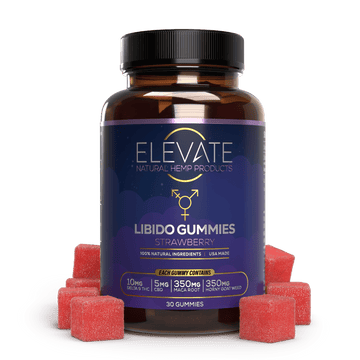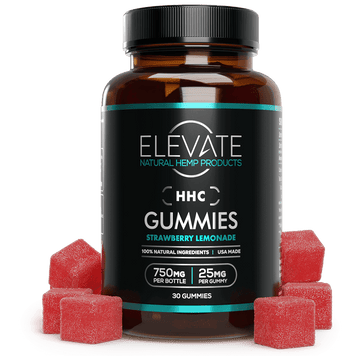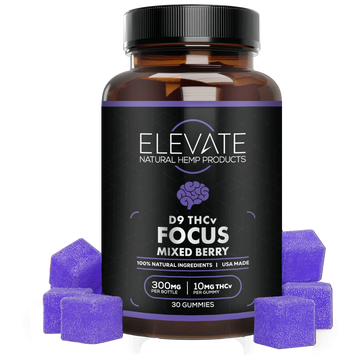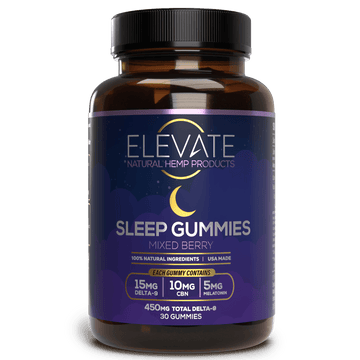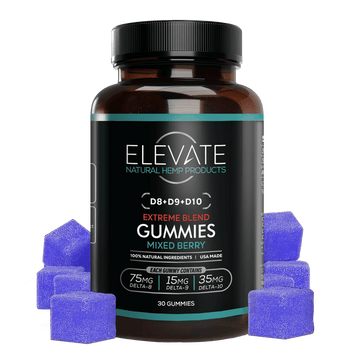THCa vs. HHC: Which Cannabinoid Is Right for You?

THCA vs HHC Comparison:
- THCA: Non-psychoactive until heated, then converts to THC. Natural cannabinoid.
- HHC: Semi-synthetic, psychoactive as-is, more shelf-stable than THC
- THCA smoked/vaped = stronger effects than HHC
- HHC better for those wanting consistent, moderate effects
Table of Contents
- So, What Exactly Is THCa?
- And What Is HHC?
- THCa vs. HHC: 5 Key Differences
- How Will THCa and HHC Affect You?
- Comparing Potential Side Effects: THCa vs. HHC
- Are THCa and HHC Legal?
- THCa vs. HHC: Which One Is Better?
- How Do THCa and HHC Compare to Other Cannabinoids?
- How to Choose the Right Product for You
- FAQs: HHC vs THCa
- THCa vs. HHC: Which One Should You Choose?
- Key Takeaways
- Related Articles
The cannabis market is buzzing with new options, and two of the most talked-about are THCa and HHC. They sound similar, but they couldn't be more different in their effects. The THCA vs HHC discussion is all about matching the cannabinoid to the experience you want. Are you seeking potential wellness benefits without the high, or are you after a smooth, manageable buzz to unwind? Knowing the difference is crucial when you're shopping for edibles, vapes, or flower, ensuring you get exactly what you came for.
In this guide, we’ll break down everything you need to know about THCa vs HHC: what they are, how they work, their effects, legality, and how to choose between them.
So, What Exactly Is THCa?
THCa (tetrahydrocannabinolic acid) is a non-intoxicating cannabinoid naturally found in raw cannabis and hemp. It's the acidic precursor to THC—the compound responsible for the high associated with marijuana.
Unlike THC, THCa won’t get you high unless it’s heated. That process, called decarboxylation, transforms THCa into psychoactive THC. If you juice raw cannabis or use THCa tinctures, you’ll feel the effects of THCa—but not the buzz.
Many people turn to THCa for its possible therapeutic benefits, such as support for inflammation, nausea, and neuroprotection. It’s popular among users looking for symptom relief without mental fog or euphoria.
The Science Behind THCa: More Than Just a Precursor
Think of THCa as THC in its raw, untouched state. Before cannabis is heated, it’s packed with THCa, not THC. This is a key difference because, on its own, THCa doesn't produce the euphoric "high" that THC is famous for. Instead, many people use it for its potential wellness properties. Some studies suggest it may help with inflammation and nausea, offering a way to get some of the plant's benefits without the psychoactive effects. It’s a great option for anyone who wants to maintain a clear head while exploring what cannabis has to offer.
How It Converts to THC
So, how does this raw cannabinoid become the THC we know? The magic happens with heat. This transformation is a scientific process called decarboxylation. When you light a joint, use a vape, or bake cannabis into brownies, the heat removes a carboxyl group from the THCa molecule, converting it into psychoactive THC. This is why eating raw cannabis flower won’t get you high, but smoking it will. The heat is the essential trigger that changes its chemical structure and its effects, delivering that familiar euphoric feeling.
And What Is HHC?
HHC (hexahydrocannabinol) is a hydrogenated cannabinoid derived from THC. Though it occurs in trace amounts in the cannabis plant, most HHC products are made through a process that adds hydrogen molecules to THC or CBD, creating a semi-synthetic but stable compound.
Unlike THCa, HHC is psychoactive. It delivers euphoric effects that some describe as smoother and less intense than Delta 9 THC. HHC binds to the endocannabinoid system, helping with relaxation, mood elevation, and discomfort relief.
HHC is often sold in vapes, gummies, and oils and is known for its long shelf life due to its chemical stability.
How HHC is Made and How It Works in the Body
So, where does HHC come from, and what does it do once it’s in your system? Unlike THCa, which is a raw, natural compound, HHC is created through a specific scientific process. This process not only makes HHC unique but also defines the kind of experience it offers. Understanding its origin and how it interacts with your body’s internal systems is key to figuring out if it’s the right fit for your wellness routine. Let's get into the specifics of how it's made and the effects it produces.
The Hydrogenation Process
HHC is found in tiny amounts in the cannabis plant, but not enough to be extracted efficiently. Instead, it’s typically made in a lab by adding hydrogen atoms to THC through a process called hydrogenation. If that sounds familiar, it’s the same basic process used to turn vegetable oil into margarine. This conversion creates a very stable molecule, which gives HHC products an impressive shelf life and makes them less susceptible to breaking down from heat or UV light. The result is a reliable, semi-synthetic cannabinoid that maintains its potency for a long time.
Interaction with the Endocannabinoid System
Once you consume HHC, it gets to work by binding with your body’s endocannabinoid system (ECS), particularly the CB1 receptors in your brain. This interaction is what produces its psychoactive effects. Many people describe the HHC high as a smoother, more clear-headed experience compared to Delta 9 THC. It often brings on feelings of relaxation, euphoria, and mood improvement without the intense mental fog or anxiety that can sometimes accompany traditional THC. This makes it a popular choice for unwinding after a long day or for social situations where you want to feel at ease and uplifted.
THCa vs. HHC: 5 Key Differences
1. Source:
THCa is found naturally in raw cannabis and hemp plants. It exists in the flower before any heat is applied. In contrast, HHC is not found in significant amounts naturally and is instead created by hydrogenating THC or CBD through a lab process. This makes HHC a semi-synthetic cannabinoid, while THCa is entirely natural in its raw form.
2. Euphoria:
THCa is non-intoxicating in its raw form. It doesn’t produce a high unless it’s heated—through smoking, vaping, or baking—at which point it becomes THC. HHC, on the other hand, is euphoric in its default state. It can produce a mild to moderate high without needing to be heated.
3. Legal Status:
Both THCa and HHC are federally legal if derived from hemp and contain less than 0.3% Delta 9 THC. However, state laws vary widely. THCa may be legal in raw form but considered illegal once heated and converted into THC. HHC sits in a legal gray area—some states have banned it entirely due to its psychoactive effects, even though it's hemp-derived.
4. Common Use:
People typically consume THCa in raw forms like juices, tinctures, or unheated flower for non-euphoric benefits. If they want to experience a high, they must heat it. HHC is most commonly found in vapes, gummies, and edibles, making it popular for those seeking a mild buzz without the intensity of Delta 9 THC.
5. Shelf Life:
HHC has a longer shelf life because it’s more chemically stable. It resists oxidation and degradation over time. THCa, however, is more sensitive to light and heat and can break down faster if not stored properly, especially in raw flower form.
1. Potency: Which One is Stronger?
When it comes to potency, the answer really depends on how you’re using them. HHC is psychoactive right out of the gate, delivering a high that many people find is similar to, but milder than, traditional THC. It can alter your mood and perception without any heat or special preparation. If you want an immediate, ready-to-go euphoric feeling, HHC is the more potent choice in its default state. On the other hand, THCa is non-psychoactive when raw. It only becomes potent when you apply heat, which converts it into THC. So, while a THCa tincture won’t get you high, smoking or vaping THCa flower definitely will. In short, HHC is stronger from the start, but activated THCa can be just as powerful.
2. Chemical Structure and Stability
The different effects of these two cannabinoids come down to their chemical makeup. HHC is created in a lab by adding hydrogen atoms to THC through a process called hydrogenation. This simple addition makes HHC a very stable compound that holds up well against heat and UV light. As a result, products like HHC gummies have a much longer shelf life. THCa, as the natural acidic form of THC, is more delicate. It’s sensitive to its environment and can start converting to THC on its own if it’s exposed to too much heat or sunlight. This is why proper storage is so important for keeping raw THCa products fresh and effective.
3. Natural vs. Semi-Synthetic
If you prefer to stick with compounds as they appear in nature, THCa is the clear winner. It’s a completely natural cannabinoid found in raw cannabis and hemp plants, representing the state of THC before it’s ever harvested or heated. HHC, in contrast, is considered semi-synthetic. While it does exist in the cannabis plant, it’s only in trace amounts that are too small to extract. The HHC you find in vapes and edibles is made in a lab by hydrogenating THC or CBD. This process modifies a natural cannabinoid to create a new, stable compound with its own unique effects, putting it in a different class than purely plant-derived THCa.
4. The Entourage Effect
The entourage effect is the idea that all the compounds in cannabis—cannabinoids, terpenes, and flavonoids—work together to produce a greater therapeutic outcome than any single compound can on its own. Since THCa comes from the raw plant, it’s often part of a full-spectrum product that contains all these other beneficial molecules, allowing you to experience the full entourage effect. HHC is usually produced as an isolate, meaning it’s separated from the other plant compounds during production. While some brands add terpenes back into their HHC products, they don’t inherently offer the same natural, whole-plant synergy that you can get from raw THCa.
5. User-Reported Effects
People often describe the HHC experience as a clear-headed and relaxing high that’s less intense than Delta 9 THC and less likely to trigger anxiety. It seems to strike a nice balance between euphoria and calm, making it a great choice for chilling out or social gatherings. Raw THCa is typically used for its potential wellness benefits without the high, like easing discomfort or inflammation. When THCa is heated, it delivers a classic cannabis high that can be very potent. So, if you’re looking for a mild, manageable buzz, HHC is a solid option. If you want therapeutic effects without intoxication, raw THCa is perfect, and if you want a traditional high, heated THCa is the way to go.
How Will THCa and HHC Affect You?
The THCa Experience: What to Expect
When consumed raw (not heated), THCa offers non-psychoactive benefits such as:
May help soothe joints and reduce discomfort
Potential neuroprotective and brain health benefits
May ease nausea or stimulate appetite
Because THCa doesn’t bind strongly to cannabinoid receptors, it doesn’t cause euphoria but may still offer medicinal support.

The HHC Experience: What to Expect
HHC offers a mild to moderate high, often described as clear-headed and calming. Users report effects like:
Mild euphoria and uplifted mood
Relaxation and physical tension relief
Sedative properties helpful for sleep or stress management
While HHC is less potent than Delta 9 THC, it can still produce psychoactive effects, especially in larger doses.
User Perspectives: The Community Weighs In
Duration of Effects
A big question people ask is, "How long will I feel this?" With THCa, the answer really depends on how you use it. If you consume it raw, you might experience gentle, non-psychoactive effects for anywhere from four to eight hours, making it a solid choice for sustained support throughout the day. But if you heat it by smoking or vaping, it converts to THC, and you’ll get a more traditional high that typically lasts two to four hours. This flexibility is a major plus for many. On the other hand, HHC offers a more predictable experience. Users often describe the effects from HHC gummies as a clear-headed and calming buzz that’s more moderate and consistent than a Delta 9 high, which is perfect if you want to unwind without feeling overwhelmed.
The Debate on "Alternative Cannabinoids"
The conversation around compounds like THCa and HHC really comes down to what you're looking for. Many people are drawn to raw THCa specifically because it *doesn't* produce a high, seeking its potential benefits for wellness without any intoxicating effects. They're the ones adding it to juices or using tinctures. Then you have the crowd that's excited about HHC because it provides a mild, enjoyable euphoria and sits in a unique legal space. For them, it’s a fantastic alternative to Delta 9 THC, especially in states with stricter cannabis laws. This legal gray area is a key part of the conversation, as some states have banned HHC despite it being hemp-derived, so it's always smart to check your local laws. This friendly debate just shows how personalized cannabis use has become, with options for nearly every preference.
Comparing Potential Side Effects: THCa vs. HHC
THCa: Generally well tolerated. When consumed raw, it’s unlikely to produce any adverse effects unless taken in extremely high doses.
HHC: May cause dry mouth, dizziness, or anxiety in sensitive users or at high doses due to its euphoric properties.
Potential Downsides of Heated THCa (Delta-9 THC)
It’s crucial to remember that the potential downsides of THCa really only appear when you heat it. In its raw form, THCa is non-intoxicating. However, once you apply heat through smoking, vaping, or baking, it converts directly into Delta-9 THC. This means the side effects are identical to those of traditional THC. Some people may experience anxiety, paranoia, dry mouth, or impaired coordination, especially with higher doses. The experience is highly individual, so what feels great for one person might be too intense for another. Understanding this conversion is key to managing your experience and finding the right dose for your goals, whether you're using THC for sleep or unwinding after a long day.
Potential Downsides of HHC
While many people describe the HHC high as clearer and less intense than Delta-9 THC, it is still a psychoactive compound. As a result, some users may experience side effects like dry mouth, dizziness, or mild anxiety, especially if they are sensitive to cannabinoids or take a higher dose than they're used to. Since HHC is a relatively new player in the cannabis market, long-term effects are not as well-studied as those of THC. This makes it even more important to choose HHC products from reputable brands that are transparent about their ingredients and provide comprehensive lab testing for purity and potency.
General Safety Tips for Cannabinoid Use
To ensure you have a safe and positive experience with any cannabinoid, a little mindfulness goes a long way. First, always start with a very small amount to see how your body reacts, especially if you're trying something new. You can always take more later, but you can't take less. Second, know your source. Always purchase products from trusted companies that provide up-to-date, third-party lab reports. This is your best guarantee that what's on the label is what's in the product. Finally, listen to your body. If you ever feel anxious or uncomfortable, take a break. Everyone reacts differently, so finding what works for you is a personal process.
Are THCa and HHC Legal?
Under the 2018 Farm Bill, hemp-derived cannabinoids with less than 0.3% Delta 9 THC are federally legal. That includes both THCa and HHC—but there are key caveats.
Understanding THCa's Legal Status
Federally legal if derived from hemp and not decarboxylated (heated).
State laws vary. Some states restrict THCa flower due to its potential to convert into THC.
Consuming THCa via smoking or vaping may be considered THC use in some jurisdictions.
State-Specific Nuances for Inhalable Products
This is where things get tricky, especially for products you smoke or vape. Because heating THCa flower converts it into THC, some states regulate it based on its "total THC" potential, making it illegal despite its federal status. Similarly, HHC's psychoactive nature has prompted several states to ban it completely, grouping it with other restricted cannabinoids. These laws can change quickly and vary significantly from one state to another, creating a confusing legal landscape. Before you purchase any inhalable products, it's essential to check your local regulations on hemp-derived cannabinoids to ensure you're staying on the right side of the law.
Is HHC Legal Where You Live?
Legally ambiguous. Though HHC is hemp-derived and not classified as THC, some states have explicitly banned it.
State-specific laws can override federal interpretation, so always check local regulations.
A Quick Heads-Up on Drug Testing
Both THCa (if heated) and HHC may cause a positive drug test result. Most standard tests detect metabolites of THC, and both cannabinoids have similar structures.
THCa vs. HHC: Which One Is Better?
It depends on your goals:
Choose THCa if you’re looking for symptom relief, anti-inflammatory benefits, or mental clarity—without a buzz. Great for medical users or those avoiding psychoactive effects.
Choose HHC if you’re looking for a mild, uplifting high with less intensity than traditional THC. It’s a good fit for casual users or those easing into cannabis.
THCa is ideal for daytime use in raw forms, while HHC is often used recreationally or in the evening for winding down.
For Pain and Inflammation
If you're looking for something to help with physical discomfort, THCa is often the go-to choice. Many people use raw THCa for its potential therapeutic benefits, including support for inflammation, without the mental fog that can come with other cannabinoids. Because it’s non-intoxicating in its raw state, you can incorporate it into your daily routine for symptom relief without any psychoactive effects. HHC can also help with discomfort, but its effects are more tied to its gentle, relaxing high, which can help take your mind off the pain rather than targeting the source directly.
For Anxiety and Stress
When it comes to managing stress, HHC is a popular option. It offers a mild to moderate high that many people describe as clear-headed and calming, making it ideal for unwinding without feeling overwhelmed. Users often report that HHC products help with relaxation and ease physical tension, which is perfect after a long day. While raw THCa is non-psychoactive and won't provide an immediate calming buzz, some find its general wellness benefits helpful. However, for a more direct and gentle euphoric effect to soothe stress, HHC is typically the preferred cannabinoid.
For Sleep Support
Both cannabinoids can play a role in your nightly routine, but they work differently. HHC’s gentle, relaxing high can be just enough to quiet a racing mind and help with mild sleep issues. It’s a great choice if you just need a little help drifting off. On the other hand, if you need something stronger, THCa might be the answer—but only when it's heated. Once decarboxylated into THC, it can be much more sedating, offering deeper relaxation for more persistent sleep problems. For a curated selection of products designed to help you rest, you can explore options specifically formulated for sleep support.
How Do THCa and HHC Compare to Other Cannabinoids?
The cannabis world is full of options, and it helps to know how newer compounds like THCa and HHC fit in with more established ones. Understanding their unique characteristics is key to finding the right product for your specific needs, whether you're looking for relaxation, therapeutic support, or a gentle buzz. By comparing them to well-known cannabinoids like Delta-8 THC and CBN, you can get a much clearer picture of the landscape. This context helps you make more informed decisions, ensuring the experience you get is the one you actually want.
Compared to Delta-8 THC
Delta-8 THC is well-known for offering a milder, clearer high than its more famous cousin, Delta-9 THC. Many people choose Delta-8 for a functional buzz with less risk of anxiety or paranoia. HHC provides a very similar experience, often described as slightly more potent than Delta-8 but still smooth and uplifting, making both great for social settings or creative work. THCa, in its raw form, is the complete opposite—it’s non-psychoactive. It only produces a high when heated, which converts it into potent THC. So, if you want a gentle euphoric effect right out of the package, HHC or Delta-8 are your go-to options, whereas raw THCa is better for therapeutic benefits without the high.
Compared to CBN
If you've heard of CBN (cannabinol), it was likely in a conversation about sleep. CBN is a minor cannabinoid that forms as THC ages, and it's famous for its potential sedative properties. Because of this, it’s a popular ingredient in products for sleep and is only considered mildly psychoactive. Neither THCa nor HHC are primarily known as sleep aids in the same way. Raw THCa is non-intoxicating and used more for daytime relief from discomfort without causing drowsiness. HHC can be relaxing and may help you wind down, but its euphoric effects make it more of a recreational or mood-lifting compound than a dedicated sleep solution like CBN.
How to Choose the Right Product for You
Before buying THCa or HHC products, follow these tips:
✅ Check third-party lab results (COAs) – Make sure products are tested for purity, potency, and compliance.
✅ Decide your preferred format – Tinctures, flower, gummies, vapes? Raw THCa vs HHC edibles offer different experiences.
✅ Consider your goals – Are you seeking wellness support or mild euphoria?
✅ Know your state laws – Some states regulate or ban these cannabinoids, even if they’re federally legal.
✅ Buy from reputable brands – Look for customer reviews, transparency, and hemp-derived sourcing.
Looking for premium lab-tested THCa or HHC products? Shop from trusted providers to get the effects you want—safely and legally.
A Note for Beginners
If you're just starting to explore cannabinoids, the main difference to remember is the feeling you'll get. HHC offers a mild to moderate high that many people find clear-headed and calming. You can expect effects like gentle euphoria, an uplifted mood, and physical relaxation, which can be great for managing stress. While HHC is less potent than traditional Delta 9 THC, it is still psychoactive, especially in larger amounts. On the other hand, THCa is completely non-intoxicating in its raw form. It won’t produce a high unless you heat it by smoking, vaping, or baking, which converts it into THC. So, if you want potential therapeutic benefits without the buzz, raw THCa is your go-to.
The Importance of Third-Party Lab Testing
In the world of hemp-derived products, not all brands are created equal. That's why third-party lab testing is so important. Reputable companies send their products to independent labs to verify their purity, potency, and legal compliance. These results, often called a Certificate of Analysis (COA), should be easily accessible on the brand's website. A COA confirms that the product contains the amount of cannabinoids advertised and is free from harmful contaminants like pesticides, heavy metals, and solvents. When you're ready to buy, always choose products from transparent brands that provide these lab results. It’s the best way to ensure you’re getting a safe and effective product that lives up to its claims.
FAQs: HHC vs THCa
Does THCa Get You High?
Only if heated. Raw THCa is non-intoxicating. Once decarboxylated (through smoking or baking), it becomes THC and may cause euphoria.
Is HHC Stronger Than THC?
Generally, HHC is milder than Delta 9 THC but still offers noticeable effects. It’s often described as more calming and less anxiety-inducing.
Can You Legally Buy THCa Online?
Yes, in many states. Hemp-derived THCa products are legal to ship if they remain under 0.3% Delta 9 THC and are not intended for smoking (depending on state laws).
Will HHC Show Up on a Drug Test?
Yes, it might. HHC may produce THC-like metabolites, leading to a false positive on standard tests.
Is THCa Better for Medical Use?
It could be. Early research suggests THCa may support inflammation and brain health without causing a high, making it ideal for therapeutic use.
THCa vs. HHC: Which One Should You Choose?
THCa and HHC each have unique benefits depending on what you’re after. If you want non-intoxicating wellness benefits, THCa is the way to go—especially in raw or tincture form. If you’re after a mild, euphoric high without the full punch of Delta 9 THC, HHC is a solid choice.
Just make sure to review the legal status in your state, check for third-party lab results, and shop from reputable hemp brands such as Elevate.
Ready to experience premium THCa or HHC products? Visit our online shop to explore safe, lab-tested hemp products tailored to your needs.
Key Takeaways
- Decide on Your Desired Effect: Your choice depends entirely on whether you want a psychoactive experience. Opt for raw THCa for potential therapeutic benefits without the high, or choose HHC for a consistent, mild, and uplifting buzz.
- Understand the Compound's Origin: THCa is a natural cannabinoid found in the raw plant, while HHC is created in a lab through hydrogenation. This makes HHC more stable with a longer shelf life, whereas raw THCa is a whole-plant option that requires proper storage.
- Verify Legality and Purity Before You Buy: Because laws differ by state, always confirm the legal status of THCa and HHC where you live. No matter which you choose, only purchase from reputable brands that provide accessible third-party lab results to ensure product safety and quality.
Related Articles
Join Our Newsletter
Sign up to be the first to know about our can't-miss product drops, special VIP offers & exclusive discounts.

